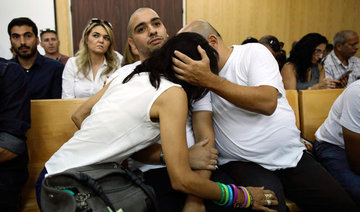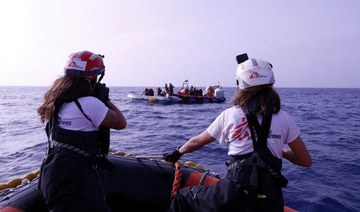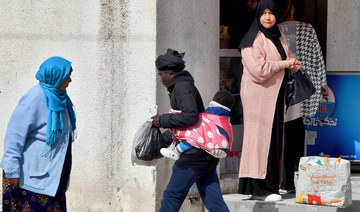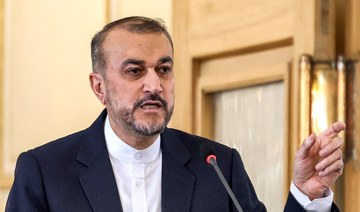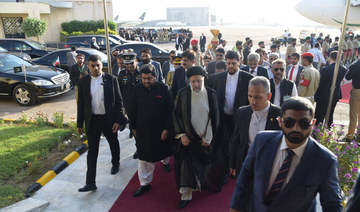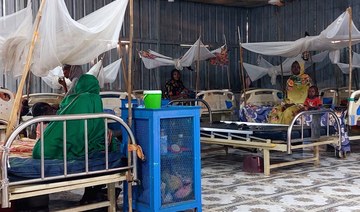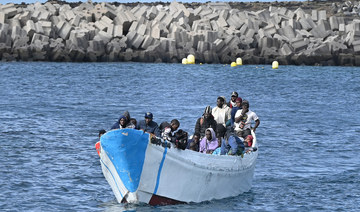RISHON LEZION, ISRAEL: An Israeli soldier convicted of manslaughter for shooting dead a prone Palestinian assailant in a trial that deeply divided the country arrived alongside motorcycle-riding supporters Wednesday to begin his 18-month prison term.
Elor Azaria, 21, entered the Tserifin military base near the city of Rishon LeZion to begin serving his sentence, his car driven by his father festooned with photographs of him and Israeli flags.
A few dozen supporters waved Israeli flags and chanted Azaria’s name as the car pulled up. Several supporters on motorcycles rode alongside his car along the route, including some wearing leather jackets with “God Bless Israel” on the back.
A smiling Azaria briefly exited the car outside the base but did not speak. His father spoke briefly, saying: “Thank you to the Israeli people,” before driving inside the base’s gates.
In a message posted on social media last week, the French-Israeli said that “I am going to prison with my head held high. I love this country with all my heart. I love the army.”
On July 30, a military court rejected Azaria’s appeal against his conviction for manslaughter and upheld the prison sentence.
He could have appealed to the country’s supreme court, but opted not to after Defense Minister Avigdor Lieberman pleaded for him to allow the country to move on.
He has instead requested a reduced sentence from military chief of staff Gadi Eisenkot, asking for community service instead of prison time.
Azaria can also request a pardon from Israeli President Reuven Rivlin, with right-wing leaders including Prime Minister Benjamin Netanyahu calling for it to be granted.
The March 2016 shooting in the occupied West Bank city of Hebron was caught on video by a human rights group and spread widely online.
It showed Abdul Fatah Al-Sharif, 21, lying wounded on the ground, shot along with another Palestinian after stabbing and wounding a soldier, according to the army.
Some 11 minutes after the initial shooting, Azaria shot him in the head without any apparent provocation.
He said he feared Sharif was wearing an explosive belt and could blow himself up, a claim judges rejected.
“His motive for shooting was that he felt the terrorist deserved to die,” Judge Col. Maya Heller said as he read the verdict in January.
Azaria, a sergeant and military medic at the time of the incident, was sentenced in February.
He later appealed the verdict, while military prosecutors asked for an increased sentence after having initially requested between three and five years.
Both requests were refused by military judges.
The trial captivated Israel and highlighted deep divisions in public opinion between those who decry the shooting and those who say it was justified.
Military leaders strongly condemned Azaria’s actions.
However, right-wing leaders including Netanyahu have called for him to be pardoned in an extraordinary public rift between politicians and the military.
Human rights groups pointed to the case as an example of what they call an unequal system of justice for Israelis and Palestinians.
Amnesty International has said Azaria’s sentence does “not reflect the gravity of the offense,” and the UN human rights office said it was an “unacceptable” punishment for “an apparent extra-judicial killing.”
Azaria completed his mandatory three-year military service on July 20 and was moved from confinement to his base to house arrest.
His imprisonment had been postponed pending his appeal.
Israeli soldier in fatal shooting of wounded Palestinian begins prison term
Israeli soldier in fatal shooting of wounded Palestinian begins prison term

Egypt’s foreign minister holds talks with director general of migration organization
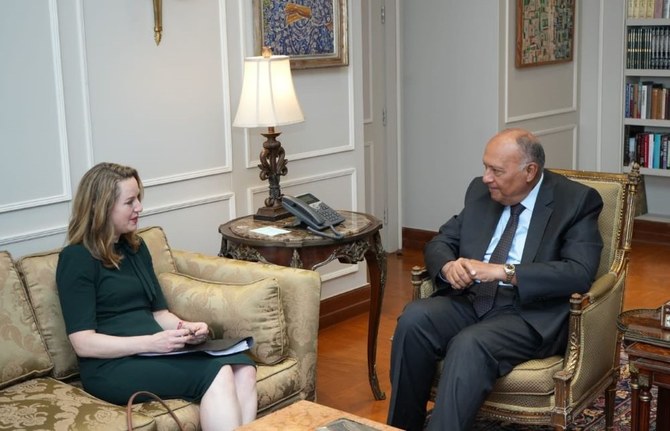
- Parties look at ways to support the Loss and Damage Fund
- Sameh Shoukry affirmed Egypt’s backing to adopt a comprehensive approach to migration governance
CAIRO: Egypt’s Minister of Foreign Affairs Sameh Shoukry held talks with the Director General of the International Organization for Migration Amy Pope during the UN official’s visit.
Shoukry expressed his appreciation of the organization’s cooperation, and spoke of aims to further relations to ensure comprehensive management of migration in a manner that contributed to achieving sustainable development in accordance with the principles and goals enshrined in the Global Compact for Migration. This stressed the importance of crystallizing the organization’s action priorities in consultation with developing countries’ governments.
He affirmed Egypt’s backing to adopt a comprehensive approach to migration governance so that it was not limited to security aspects only, but also took into account the development aspects associated with them, while addressing the root causes that lead to illegal immigration.
The minister also praised existing cooperation with the IOM in promoting ways of legal labor mobility and bridging the existing gaps in labor markets, thus achieving the interests of origin and destination states and migrants alike.
Shoukry noted that Egypt was facing increasing flows of migrants forced to flee their countries in pursuit of stability as a result of conflicts, economic reasons, or the repercussions of climate change, which had been clearly reflected in the sharp increase in the numbers of immigrants to Egypt.
He said that the support that Egypt receives from the international community was not commensurate with the burdens it bears to provide a decent life for those arriving, especially since the phenomenon had coincided with a period in which the Egyptian economy had suffered from the consequences of global crises, which had necessitated the organization to play its role in providing necessary support.
Pope thanked Egypt for its fruitful cooperation on issues involving the impact of climate change on migration, especially during Egypt’s presidency of COP27.
The parties also looked at ways to support and operationalize the Loss and Damage Fund and its important role in enhancing the ability of states to review the devastating effects of climate change and the impact on migration flows. They also spoke of cooperation between Egypt and the IOM in Africa.
Ministry of Foreign Affairs spokesperson Ahmed Abu Zeid said the meeting also looked at developments taking place in the region, with Shoukry and Pope discussing the situation in Gaza, and providing humanitarian aid and safe havens to shelter the displaced.
In connection with developments in Sudan, Pope spoke of her appreciation of Egypt’s reception of a large number of displaced Sudanese nationals since the beginning of the crisis, as well as the Egyptian authorities’ role in providing support to those fleeing the conflict, and meeting their needs.
The UN official expressed the IOM’s readiness to provide support for Egypt in order to enhance its ability to care for Sudanese refugees, in cooperation with the relevant ministries, noting that the organization attached importance to Sudan for fear of it turning into a forgotten crisis.
Sudan military downs drones targeting its HQ in Shendi, say army sources
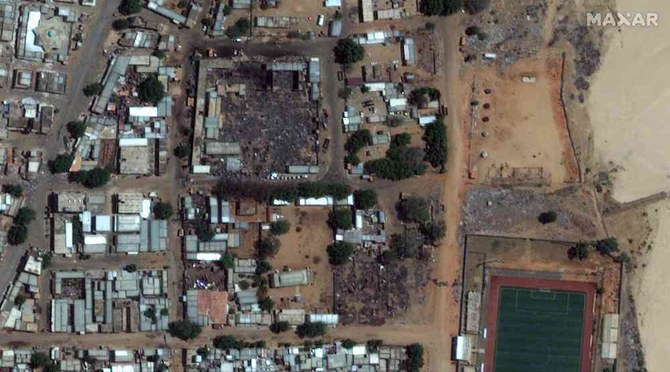
- None of the drones hit their target, the army sources said
- Sudan’s army is battling the paramilitary Rapid Support Forces for control of the vast north African country
CAIRO: Sudan’s army used anti-aircraft missiles on Tuesday to shoot down drones targeting its headquarters in the city of Shendi, witnesses and army sources said, the latest in a series of such drone attacks.
None of the drones hit their target, the army sources said. Reuters could not independently verify the report.
The head of Sudan’s army, General Abdel Fattah Al-Burhan, arrived on Monday in Shendi, which is some 180 km (112 miles) north of the capital Khartoum, army media reported earlier. It was not immediately clear whether he remains in the area.
Sudan’s army is battling the paramilitary Rapid Support Forces (RSF) for control of the vast north African country.
Tuesday’s drone attack is the third targeting areas that remain solidly under army control. The city of Atbara, also in River Nile state, and Al-Gedaref state to the east have also come under drone attack.
Both the army and the RSF have used drones in the conflict, which erupted a year ago.
The RSF, which controls much of Khartoum and western regions of the country, has not claimed responsibility for any of the attacks.
Shendi residents said the attacks have created panic in the town.
The war between the army and RSF has sparked warnings of famine, displaced millions, killed thousands in the crossfire and given way to ethnic killings by the RSF and allied militias.
The war appears likely to spread to the city of Al-Fashir, the army’s final holdout in the Darfur region, with many warning of a humanitarian catastrophe.
Iran threatens to annihilate Israel should it launch a major attack
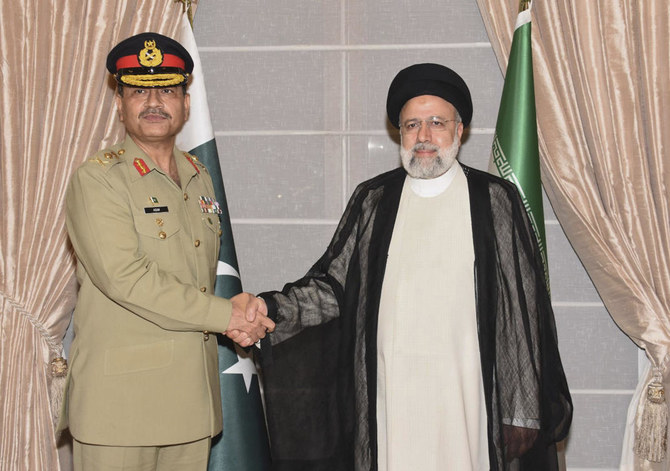
- Raisi began a three day visit to Pakistan on Monday
- "The Islamic Republic of Iran will honourably continue to support the Palestinian resistance," Raisi added
DUBAI: An Israeli attack on Iranian territory could radically change dynamics and result in there being nothing left of the "Zionist regime", Iran's President Ebrahim Raisi was quoted as saying on Tuesday by the official IRNA news agency.
Raisi began a three day visit to Pakistan on Monday and has vowed to boost trade between the neighbouring nations to $10 billion a year.
The two Muslim neighbours are seeking to mend ties after unprecedented tit-for-tat military strikes this year.
On Friday, explosions were heard over the Iranian city of Isfahan in what sources said was an Israeli attack, but Tehran played down the incident and said it had no plans for retaliation.
Iran launched a barrage of missiles and drones at Israel on April 13 in what it said was retaliation for Israel's suspected deadly strike on its embassy compound in Damascus on April 1, but almost all were shot down.
"The Islamic Republic of Iran will honourably continue to support the Palestinian resistance," Raisi added in the speech in Lahore.
Truce crumbles in Sudanese army’s last Darfur holdout
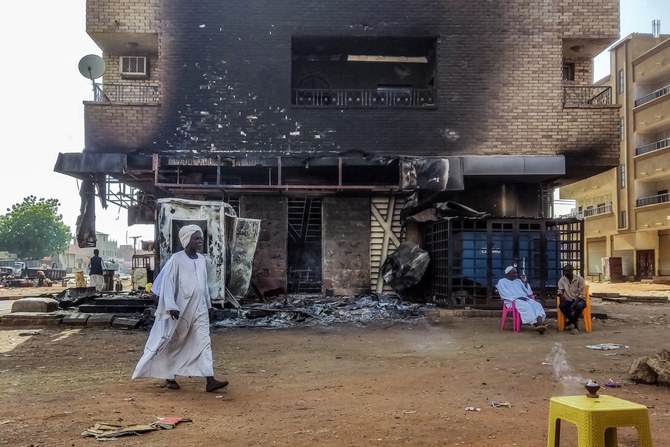
- Al-Fashir is the last major city in the vast, western Darfur region not under control of the paramilitary Rapid Support Forces (RSF)
- Witnesses say the army has reinforced supplies and troops, including through an air drop to its base in the city
CAIRO/DUBAI: Attacks around the Sudanese city of Al-Fashir have shattered a truce that protected it from a year-old war, leading to warnings of a new wave of inter-communal violence and humanitarian risks for 1.6 million residents crammed into the North Darfur capital.
Al-Fashir is the last major city in the vast, western Darfur region not under control of the paramilitary Rapid Support Forces (RSF). The RSF and its allies swept through four other Darfur state capitals last year, and were blamed for a campaign of ethnically driven killings against non-Arab groups and other abuses in West Darfur.
The fight for Al-Fashir, a historic center of power, could be more protracted, inflame ethnic tensions that surfaced in the early-2000s conflict in the region and reach across Sudan’s border with Chad, say residents, aid agencies and analysts.
Al-Fashir’s population includes an estimated half a million people displaced during that earlier conflict, when the army, assisted by Arab militias that evolved into the RSF, put down a rebellion by non-Arab rebel groups.
About half a million more people moved into the city during the war that broke out between the army and the RSF in the capital Khartoum in April 2023, as long-simmering tensions over integrating the two forces came to a head.
As the war spread to other parts of the country, local leaders brokered a truce in Al-Fashir, with the RSF confined to eastern areas of the city while the former rebel groups stayed neutral.
But the arrangement fell apart after the RSF took the town of Melit this month, effectively blockading Al-Fashir.
Witnesses say the army has reinforced supplies and troops, including through an air drop to its base in the city, unlike in other state capitals where soldiers quickly fled.
Two prominent former rebel groups, Minni Minawi’s Sudan Liberation Army (SLA) and Jibril Ibrahim’s Justice and Equality Movement, said they would also defend against the RSF.
Many non-Arabs in Al-Fashir are gripped with fear.
“We don’t know what to do,” 39-year-old resident Mohamed Gasim told Reuters by phone. “Al-Fashir is dangerous, but leaving is more dangerous.”
VILLAGES RAZED
Even before the truce collapsed, occasional skirmishes killed more than 220 people in Al-Fashir in the last year, according to Ismail Khareef, an activist in Abu Shouk, one of the displacement camps that dot the city.
Clashes on April 16 left at least 18 dead, Khareef said. Gunfire and projectiles, including from army warplanes, have fallen on homes, he and other residents say.
Since the start of the month, at least 11 villages on Al-Fashir’s outskirts have been razed, according to satellite imagery obtained by the Yale Humanitarian Research Lab. At least 36,000 have been displaced, the United Nations estimates.
Local activists and an SLA spokesperson blamed the RSF and allied militias, who have been known to use arson in past attacks, including in West Darfur. The activists said that survivors of the attacks reported around 10 people killed and that the attackers used ethnic insults.
The RSF denied attacking Al-Fashir and said it was careful to keep clashes away from civilians in the city, accusing the army and allied groups of attacking it on the outskirts. The RSF has previously denied responsibility for ethnic violence in Darfur.
The army did not immediately respond to requests for comment.
Al-Fashir itself has not had functioning running water or power lines for a year, said Awadalla Hamid, Darfur director for Practical Action, speaking to Reuters from the city, where few international humanitarians remain. Only one public hospital is functioning, while displaced people are crammed into schools and public buildings, he said.
Jerome Tubiana, an expert on Darfur and adviser to medical charity MSF, said all-out fighting “risks already complicating further humanitarian access, at a time where available data shows Al-Fashir is suffering of an extremely serious food crisis.”
SPILLOVER RISK
Since the war began, only small quantities of aid have entered Al-Fashir, the only army-approved conduit for shipments to other parts of Darfur. Residents say that though markets are functioning, the RSF’s control of the main road has caused prices for fuel, water and other goods to soar.
Recent tensions and violence around Al-Fashir have also raised concerns about a wider spillover.
The former rebel groups fighting alongside the army hail from the Zaghawa tribe, which reaches across the border into Chad, counting Chadian leader Mahamat Idriss Deby as a member.
Arab and non-Arab tribes like the Zaghawa have long clashed over land and valuable resources in Darfur, analysts say.
Complicating matters is the entrance of the forces belonging to Musa Hilal, a leading Arab commander from the early 2000s and rival of RSF commander Mohamed Hamdan Dagalo, known as Hemedti, despite hailing from the same tribe. A spokesperson confirmed a video of Hilal addressing forces in North Darfur on Monday, but said that it was too soon to say if the forces would join the fight in Al-Fashir or elsewhere.
“Even if there was a ceasefire between SAF and RSF this is way beyond them. There are scores being settled and tensions being renewed,” said Jonas Horner, an independent Sudan analyst.
Tunisian coast guard retrieves bodies of 19 migrants
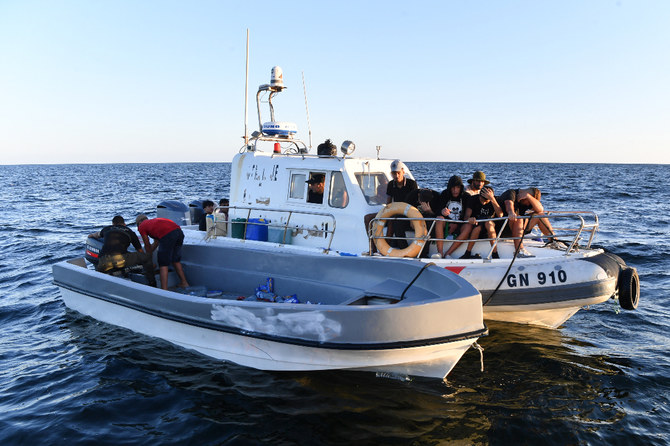
TUNIS, April 23 : The Tunisian coast guard has retrieved the bodies of 19 migrants who were trying to reach the Italian island of Lampedusa, the national guard said on Tuesday.
The latest incident took the number of migrant deaths off the Tunisian coast to nearly 200 in first four months of this year.


